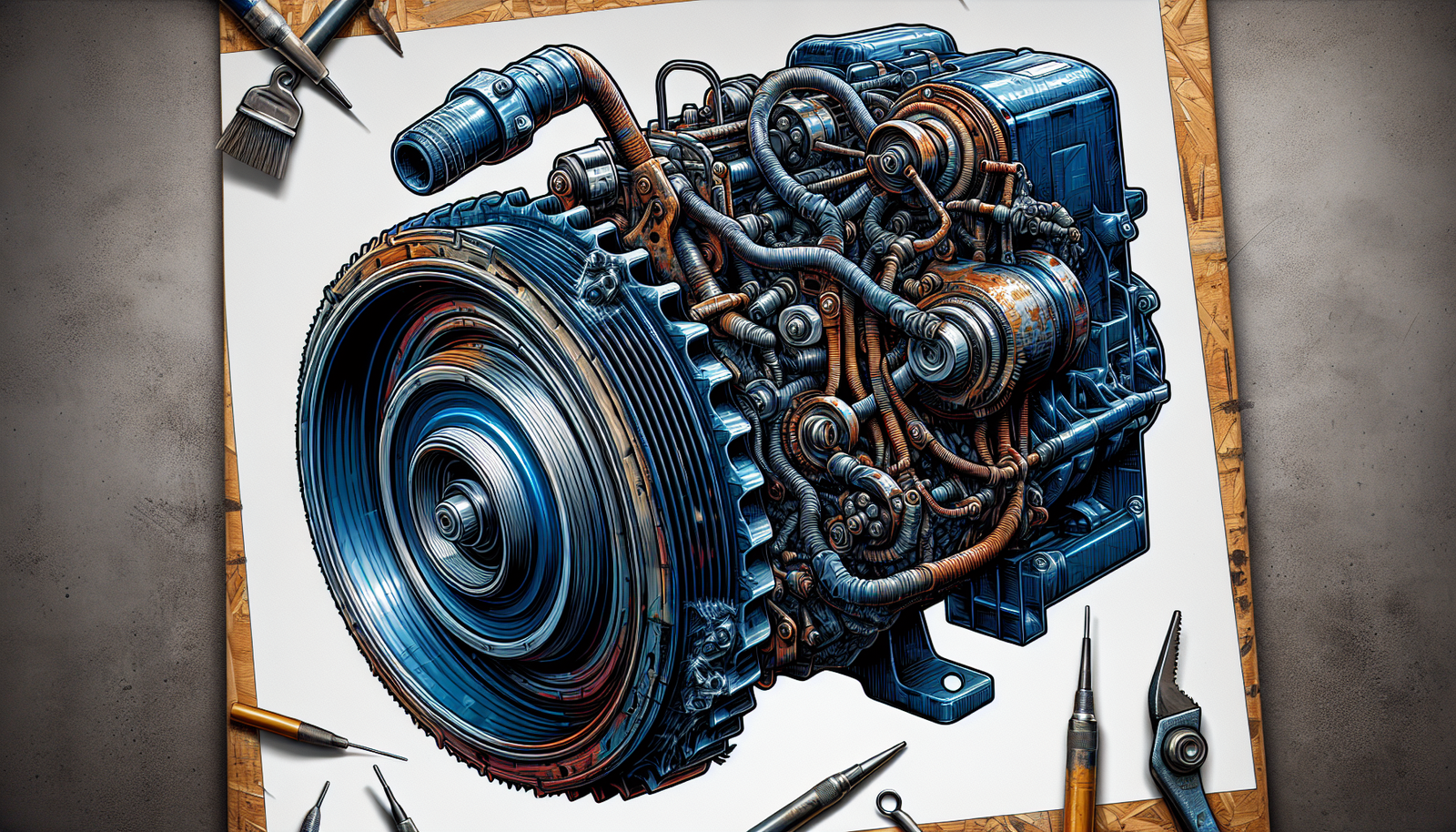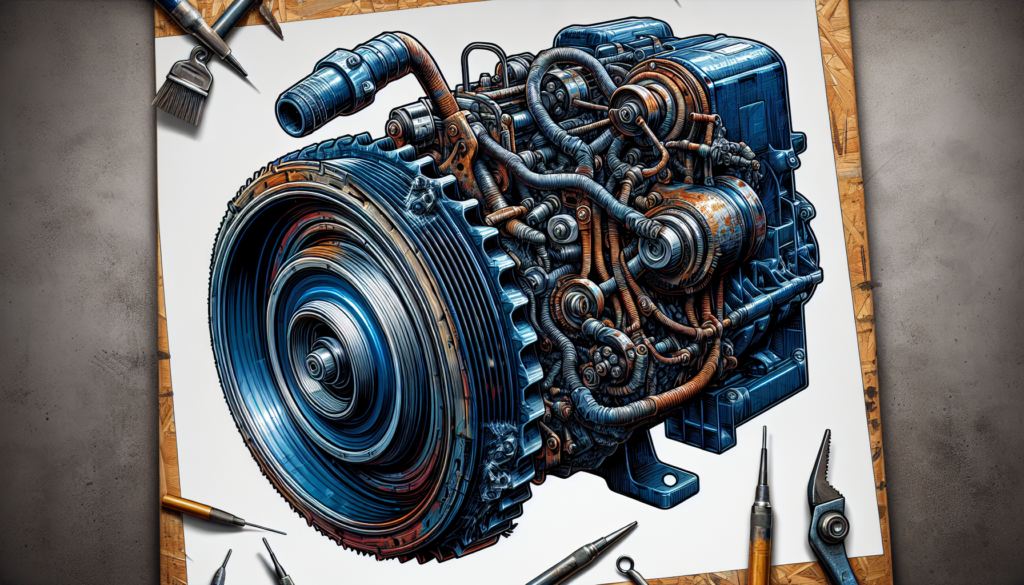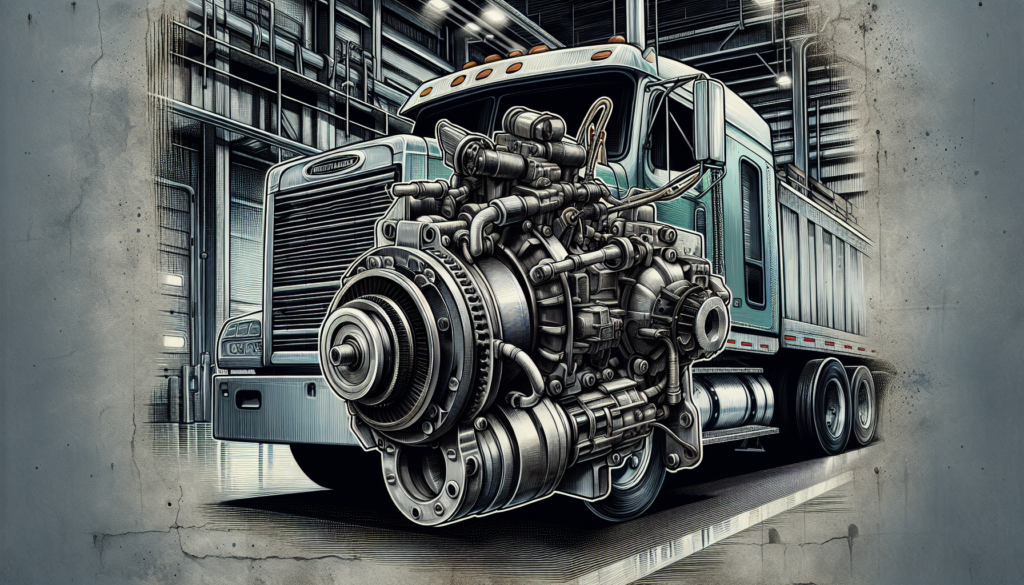
Have you noticed a decrease in the cooling performance of your Freightliner’s air conditioning system? It could be a sign that the air conditioning compressor is starting to fail. The air conditioning compressor plays a crucial role in the cooling process, and its failure could lead to uncomfortable, sweltering journeys. In this article, we will explore some telltale signs that indicate a failing air conditioning compressor in a Freightliner, allowing you to take timely action and avoid any further inconvenience. So, let’s get started and learn how to identify these signs!

Strange Noises
Loud Clanking or Knocking Sounds
If you start hearing loud clanking or knocking sounds coming from your air conditioning system, it could be a sign that your compressor is failing. These noises may indicate that the internal components of the compressor are not functioning properly or are loose. It is essential to address this issue promptly to prevent further damage to the compressor and other components of your air conditioning system.
High-Pitched Squealing or Screeching Sounds
Another indicator of compressor failure is the presence of high-pitched squealing or screeching sounds when your air conditioning system is running. These noises are often caused by a worn-out or damaged compressor belt. If the belt becomes loose or frayed, it can create a squealing noise as it rubs against other components. Ignoring this issue can lead to complete belt failure and potential damage to the compressor.
Rattling or Grinding Noise
If you notice a rattling or grinding noise coming from your air conditioning system, it may be a sign of compressor failure. These noises typically occur due to loose or damaged internal components within the compressor. Rattling noises can indicate loose bolts or screws, while grinding noises may suggest that the compressor’s bearings are worn out. Both situations require immediate attention to prevent further damage and ensure the proper functioning of your air conditioning system.
Unusual Vibrations
Excessive Vibration in the Cabin
Feeling excessive vibrations in the cabin of your vehicle while the air conditioning system is running can be a clear sign of compressor failure. These vibrations may indicate that the compressor’s internal components are not functioning correctly or are misaligned. Excessive vibration can also be a result of worn-out or damaged belts, pulleys, or motor mounts. If left unaddressed, these vibrations can lead to further damage to the compressor and other vital components of your air conditioning system.
Vibrations Felt on the Steering Wheel
Experiencing vibrations on the steering wheel while using your air conditioning system is another indication of a failing compressor. These vibrations can be felt when the compressor’s internal parts are not functioning smoothly or when the compressor belt is worn out or damaged. Steering wheel vibrations are not only an annoyance but can also impact your driving experience and require immediate attention to prevent any potential safety hazards.
Visible Shaking of the Compressor
If you notice visible shaking of the compressor unit itself, it is a clear sign that the compressor is on the verge of failure. The shaking motion indicates severe issues with the internal components, such as loose or worn-out parts or a damaged motor mount. Continuing to operate the air conditioning system in this condition can lead to complete compressor failure and will require costly repairs or replacement.
Poor Cooling Performance
Lack of Cold Air
One of the most apparent signs of a failing air conditioning compressor is a lack of cold air coming from the vents. When the compressor is not functioning correctly, it fails to cool down the refrigerant, resulting in warm air blowing into the cabin. If you notice a significant decrease in cooling performance or your air conditioning system simply doesn’t produce cold air at all, it is crucial to have the compressor inspected and repaired promptly.
Intermittent Cooling
Experiencing intermittent cooling is another possible indication of compressor failure. In this case, your air conditioning system may produce cold air for a brief period and then suddenly stop cooling altogether. This inconsistency could be caused by a failing compressor that struggles to maintain consistent cooling pressure. Ignoring this issue may lead to complete compressor failure and costly repairs in the future.
Inconsistent Cooling
If your air conditioning system is blowing cold air, but the cooling performance is inconsistent, it could be a sign of compressor failure. Inconsistent cooling means that your air conditioning system may not cool the cabin evenly, leaving certain areas uncomfortably warm. This issue often occurs when the compressor’s internal components are malfunctioning or if there are refrigerant-related problems. Addressing this issue promptly is vital to ensure optimal cooling performance and prevent further damage to the compressor.
Increased Energy Consumption
Higher Fuel Consumption
When the air conditioning compressor is failing, it tends to put extra strain on the engine, leading to higher fuel consumption. This occurs because a failing compressor requires more power from the engine to compensate for its reduced efficiency in cooling the refrigerant. If you notice a significant increase in fuel consumption without any other identifiable factors, it is recommended to have your compressor inspected and repaired to restore optimal energy efficiency.
Increased Engine Load
In addition to higher fuel consumption, a failing air conditioning compressor can also place an increased load on the engine. The compressor relies on the engine’s power to function properly, and when it begins to fail, it can cause the engine to work harder. This increased load not only affects fuel efficiency but can also lead to additional wear and tear on the engine components. Promptly addressing the compressor issue will help alleviate the strain on your engine and prevent potential engine damage.
Frequent AC Cycling
If you notice your air conditioning system cycling on and off more frequently than usual, a failing compressor could be the culprit. The compressor’s primary function is to maintain a consistent flow of cooled refrigerant throughout the system. When the compressor starts to fail, it struggles to maintain the appropriate pressure, causing the system to cycle on and off more frequently. Frequent cycling can lead to decreased energy efficiency and may result in further damage to the compressor if left unresolved.

Leaking Refrigerant
Visible Refrigerant Leaks
One of the most obvious signs of a failing compressor is the presence of visible refrigerant leaks. If you notice refrigerant pooling under your vehicle or around the air conditioning system, it indicates a leak in the compressor or other components. Refrigerant leaks not only compromise the cooling performance of your air conditioning system, but they can also be harmful to the environment. If you suspect a refrigerant leak, it is crucial to have it repaired immediately by a trained professional to prevent further damage and ensure your system operates safely.
Oil Stains on the Compressor
Another indicator of a failing air conditioning compressor is the presence of oil stains on the compressor unit. The compressor requires a specific amount of lubricating oil to ensure smooth operation and prevent damage to its internal components. If the compressor is leaking oil, it can affect its ability to function correctly and may lead to further mechanical failures. If you observe oil stains on the compressor, it is essential to have it inspected and repaired to maintain the integrity of your air conditioning system.
Foul Odor from the AC Vents
A failing air conditioning compressor may produce a foul odor when the system is running. This odor is often described as a musty or rotten smell and can be an indication of a refrigerant leak or a buildup of contaminants in the system. The presence of a foul odor not only affects your comfort but may also indicate potential health hazards. If you notice any unusual odors coming from your air conditioning vents, it is crucial to have the system inspected and repaired by a professional to ensure safe and effective operation.
Electrical Issues
Compressor Not Engaging
If your air conditioning compressor fails to engage when you activate the system, it is a clear sign of an electrical issue. The compressor relies on electrical signals to engage and begin the cooling cycle. However, when electrical problems occur, such as a faulty relay or a defective compressor clutch, it can prevent the compressor from engaging. If you experience this issue, it is essential to have the electrical components of your air conditioning system inspected and repaired to restore proper functionality.
Frequent AC System Malfunctions
Experiencing frequent malfunctions in your air conditioning system, such as the system turning on and off unexpectedly, can be an indication of electrical issues with the compressor. Electrical failures can disrupt the proper functioning of the compressor, leading to erratic system performance. If you notice unusual system malfunctions, it is recommended to have the electrical components thoroughly inspected and repaired to avoid potential compressor failure and ensure reliable operation.
Blown Fuses or Tripped Breakers
Another clear sign of electrical issues related to the air conditioning compressor is frequently blown fuses or tripped breakers. If you find that your fuses are repeatedly blowing or your breakers are frequently tripping when you activate the air conditioning system, it is crucial to address the underlying electrical problem. Faulty wiring, a short circuit, or a failing compressor motor can cause electrical overloads, leading to blown fuses or tripped breakers. Having a professional diagnose and repair the electrical issues is essential to maintain the proper functioning of your air conditioning system.

Excessive Compressor Cycling
Short Cycling
Excessive short cycling occurs when the air conditioning compressor rapidly turns on and off within a short period. This cycling can be a sign of compressor failure or other issues within the system. Short cycling can lead to inefficient cooling, increased energy consumption, and potential damage to the compressor motor. If you notice your air conditioning system cycling on and off rapidly, it is crucial to have it inspected and repaired to prevent further damage and ensure optimal performance.
Frequent On/Off Cycling
Similar to short cycling, frequent on/off cycling is another indication of compressor problems. When the compressor frequently cycles on and off but does not provide consistent cooling, it may be due to failing internal components or refrigerant-related issues. Frequent cycling not only impacts the comfort and cooling efficiency of your air conditioning system but also increases wear and tear on the compressor and other system components. To avoid unnecessary strain on your compressor, it is recommended to have any cycling issues addressed promptly by a professional technician.
Unusual Compressor Noise During Cycling
If you hear unusual noises coming from your air conditioning compressor during cycling, it can be an indication of impending failure. These noises may include banging, clunking, or grinding sounds. Unusual compressor noise during cycling often occurs when the internal components are struggling to function correctly or when there is damage within the compressor itself. Ignoring these noises can lead to further damage and potentially a complete compressor breakdown. It is crucial to have the compressor inspected and repaired as soon as possible to prevent further damage to your air conditioning system.
Hot Air from AC Vents
Air Conditioning Blowing Warm Air
One of the most noticeable signs of a failing air conditioning compressor is when the system blows warm air instead of cold air. This can occur due to a variety of reasons, including low refrigerant levels, a malfunctioning compressor clutch, or compressor failure. When the compressor is not functioning correctly, it cannot cool down the refrigerant, resulting in warm air being circulated into the cabin. If you experience this issue, it is essential to have your air conditioning system evaluated and repaired by a professional to restore cool airflow.
Insufficient Cooling
In addition to blowing warm air, a failing air conditioning compressor can also lead to insufficient cooling of the cabin. The compressor’s primary function is to pressurize and cool the refrigerant, allowing it to absorb heat from the cabin air. If the compressor is not functioning optimally, it will struggle to maintain the necessary cooling pressure, resulting in inadequate cooling performance. If you notice that your air conditioning system is not providing sufficient cooling, it is crucial to address the issue to restore comfortable temperatures and prevent further compressor damage.
No Cool Air at All
When the air conditioning compressor completely fails, you may experience a complete lack of cool air from the vents. This occurs when the compressor is no longer able to pressurize the refrigerant and cool it down. If you turn on your air conditioning system, and there is no cool air coming from the vents, it is important to have your compressor inspected and possibly replaced. Without a functioning compressor, your air conditioning system will not be able to cool the cabin air, resulting in discomfort during hot weather conditions.

Burning Smell
Strange Odor Like Burning Plastic
If you detect a strange odor resembling burning plastic coming from your air conditioning system, it could be an indication of compressor failure. This smell may occur when the compressor motor or its components overheat due to excessive strain or internal damage. A burning plastic smell should never be ignored, as it can be a sign of potential electrical issues or impending compressor failure. It is essential to have the source of the odor identified and repaired immediately to prevent further damage or potential safety hazards.
Burning Rubber Smell
Another type of odor you may encounter is a burning rubber smell. This smell can indicate a failing compressor belt that is slipping or rubbing against other components. The compressor belt is crucial for the proper operation of the compressor, and any issues with it can lead to compressor failure and compromised cooling performance. If you notice a burning rubber smell, it is advisable to have your air conditioning system inspected by a professional to address any belt-related issues and ensure the safe and efficient operation of your compressor.
Electrical Burning Smell
If you experience an electrical burning smell coming from your air conditioning system, it is a clear indication of electrical issues that require immediate attention. This smell often occurs when there is a short circuit, damaged wiring, or an overheating compressor motor. Ignoring an electrical burning smell can lead to severe damage to the compressor and potential safety hazards. It is crucial to have a professional technician diagnose and repair the electrical problems to prevent further damage and ensure the safe operation of your air conditioning system.
Compressor Clutch Failure
Clutch Slipping
The compressor clutch is responsible for engaging and disengaging the compressor as needed. When the compressor clutch starts to slip, it may result in inefficient compressor operation and inadequate cooling. You may notice a decrease in the cooling performance or sporadic cooling when the clutch slips. If this issue persists, it can lead to complete compressor failure. Having the clutch inspected and repaired promptly can help prolong the life of your compressor and ensure optimal cooling performance.
Clutch Not Engaging or Disengaging Properly
If you encounter issues with the compressor clutch not engaging or disengaging as it should, it is an indication of potential compressor clutch failure. The clutch is essential for controlling the compressor’s operation, and any malfunction in this component can affect the overall performance of your air conditioning system. Issues with the clutch’s engagement or disengagement can manifest as intermittent cooling, inconsistent cooling, or no cool air at all. To avoid further damage to the compressor, it is crucial to have the clutch inspected and repaired by a professional technician.
Excessive Clutch Noise
When the air conditioning compressor’s clutch is failing, you may hear excessive noise coming from the clutch itself. This noise can range from grinding or squealing sounds to rattling or knocking noises. The presence of these unusual sounds indicates potential clutch failure and should be addressed promptly. Ignoring excessive clutch noise can lead to further damage to the compressor and the clutch assembly, resulting in costly repairs or replacement. Having the clutch inspected and repaired will help maintain the proper functioning of your air conditioning system.
In conclusion, it is essential to pay attention to the various signs and symptoms of a failing air conditioning compressor in your Freightliner. Strange noises, unusual vibrations, poor cooling performance, increased energy consumption, leaking refrigerant, electrical issues, excessive compressor cycling, hot air from AC vents, burning smells, and compressor clutch failure are all indicators that your compressor may be failing. Monitoring these signs and promptly addressing any issues will help maintain the optimal performance of your air conditioning system and ensure your comfort during hot weather conditions. If you detect any of these signs, it is strongly recommended to consult a professional technician to diagnose and repair the specific problems with your air conditioning compressor.
